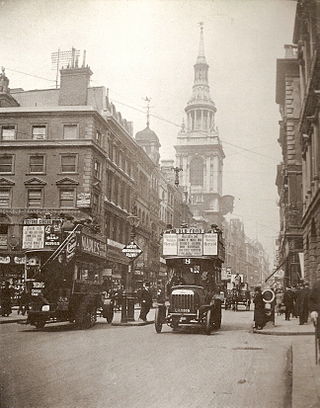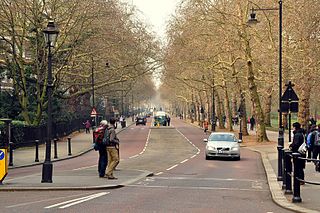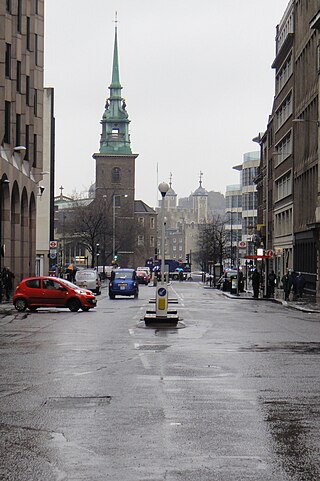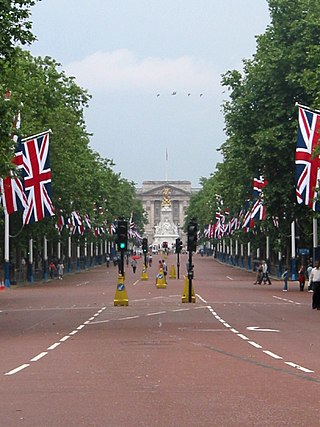
Athletics is a group of sporting events that involves competitive running, jumping and throwing. The most common types of athletics competitions are track and field, road running, cross-country running, and racewalking.

The London Marathon is an annual marathon held in London, England. Founded by athletes Chris Brasher and John Disley in 1981, it is typically held in April, although it moved to October for 2020, 2021, and 2022 due to the COVID-19 pandemic. The largely flat course is set around the River Thames, starting in Blackheath and finishing at The Mall. Hugh Brasher is the current race director and Nick Bitel its chief executive.

The Mall is a ceremonial route and roadway in the City of Westminster, central London, that travels 1 kilometre (0.62 mi) between Buckingham Palace at its western end and Trafalgar Square via Admiralty Arch to the east. Along the north side of The Mall is green space and St. James's Palace with other official buildings, and to the south is St James's Park. Near the east end at Trafalgar Square and Whitehall it is met by Horse Guards Road and Spring Gardens, near the west end at the Victoria Memorial it is met by the Constitution Hill roadway and the Spur Road to the street of Buckingham Gate. It is closed to traffic on Saturdays, Sundays, public holidays and on ceremonial occasions.

Cheapside is a street in the City of London, the historic and modern financial centre of London, England, which forms part of the A40 London to Fishguard road. It links St Martin's Le Grand with Poultry. Near its eastern end at Bank Junction, where it becomes Poultry, is Mansion House, the Bank of England, and Bank station. To the west is St Paul's Cathedral, St Paul's tube station and square.

Cannon Street is a road in the City of London, the historic nucleus of London and its modern financial centre. It runs roughly parallel with the River Thames, about 250 metres (820 ft) north of it, in the north of the City.

Gracechurch Street is a main road in the City of London, the historic and financial centre of London, England, which is designated the A1213.

Eastcheap is a street in central London that is a western continuation of Great Tower Street towards Monument junction. Its name derives from cheap, the Old English word for market, with the prefix 'East' distinguishing it from Westcheap, another former market street that today is called Cheapside.

The Ceremony of the Keys is an ancient ritual, held every evening at the Tower of London, when the main gates are locked for the night. It is said to be the oldest extant military ceremony in the world, and is the best-known ceremonial tradition of the Tower.

Fenchurch Street is a street in London, England, linking Aldgate at its eastern end with Lombard Street and Gracechurch Street in the west. It is a well-known thoroughfare in the City of London financial district and is the site of many corporate offices and headquarters. The name "Fenchurch" means "church in the fenny or marshy ground" and presumably refers to St Gabriel Fenchurch, which stood at the junction of Fenchurch Street and Cullum Street until it was destroyed by the Great Fire.

Cornhill is a ward and street in the City of London, the historic nucleus and financial centre of modern London, England. The street runs between Bank Junction and Leadenhall Street.

Northumberland Avenue is a street in the City of Westminster, Central London, running from Trafalgar Square in the west to the Thames Embankment in the east. The road was built on the site of Northumberland House, the London home of the Percy family, the Dukes of Northumberland between 1874 and 1876, and on part of the parallel Northumberland Street.

Birdcage Walk is a street in the City of Westminster in London. It runs east–west as a continuation of Great George Street, from the crossroads with Horse Guards Road and Storey's Gate, with the Treasury building and the Institution of Mechanical Engineers on the northeast corner, to a junction with Buckingham Gate, at the southeast corner of Buckingham Palace. St. James's Park lies to the north, whilst to the south are the backs of buildings on Old Queen Street, Queen Anne's Gate and Petty France, and, at the western end, the Wellington Barracks of the Brigade of Guards.

Gresham Street in the City of London is named after the English merchant and financier Thomas Gresham.

Tower is one of the 25 wards of the City of London and takes its name from its proximity to the Tower of London. The ward covers the area of the City that is closest to the Tower.

Great Tower Street, originally known just as Tower Street, is a street in the City of London, the historic nucleus and modern financial centre of London, England. It forms an eastern continuation of Eastcheap starting at Idol Lane, and leads towards Byward Street and Tower Hill. On Byward Street, opposite Great Tower Street, is the historic church All Hallows-by-the-Tower.

Queen Victoria Street, named after the British monarch who reigned from 1837 to 1901, is a street in London that runs east by north from its junction with New Bridge Street and Victoria Embankment in the Castle Baynard ward of the City of London, along a section that divides the wards of Queenhithe and Bread Street, then lastly through the middle of Cordwainer ward, until it reaches Mansion House Street at Bank junction. Beyond Bank junction, the street continues north-east as Threadneedle Street which joins Bishopsgate. Other streets linked to Queen Victoria Street include Puddle Dock, Cannon Street, Walbrook and Poultry.

The 2012 Olympic Marathon Course is that of both the men's and women's marathon races at the 2012 Olympic and Paralympic Games in London.

Thames Street, divided into Lower and Upper Thames Street, is a road in the City of London, the historic and financial centre of London. It forms part of the busy A3211 route from Tower Hill to Westminster. The London Bridge underpass marks the divide between Upper and Lower Thames Street, with Lower to the east and Upper to the west.

Queen Street is a street in the City of London which runs between Upper Thames Street at its southern end to Cheapside in the north. The thoroughfares of Queen Street and King Street were newly laid out, cutting across more ancient routes in the City, following the Great Fire of London in 1666; they were the only notable new streets following the fire's destruction of much of the City.

Michael Roeger is an Australian T46 athletics competitor. He competed at the 2008, 2012, 2016, 2020 and 2024 Summer Paralympics in athletics in middle distance and marathon running events. He has won one gold, one silver and four bronze medals at the World Para Athletics Championships and a silver and bronze medal at the Paralympics. His gold in the Men's T46 marathon at the 2019 World Para Athletics Championships was held as part of the London Marathon, set a new world record.





















